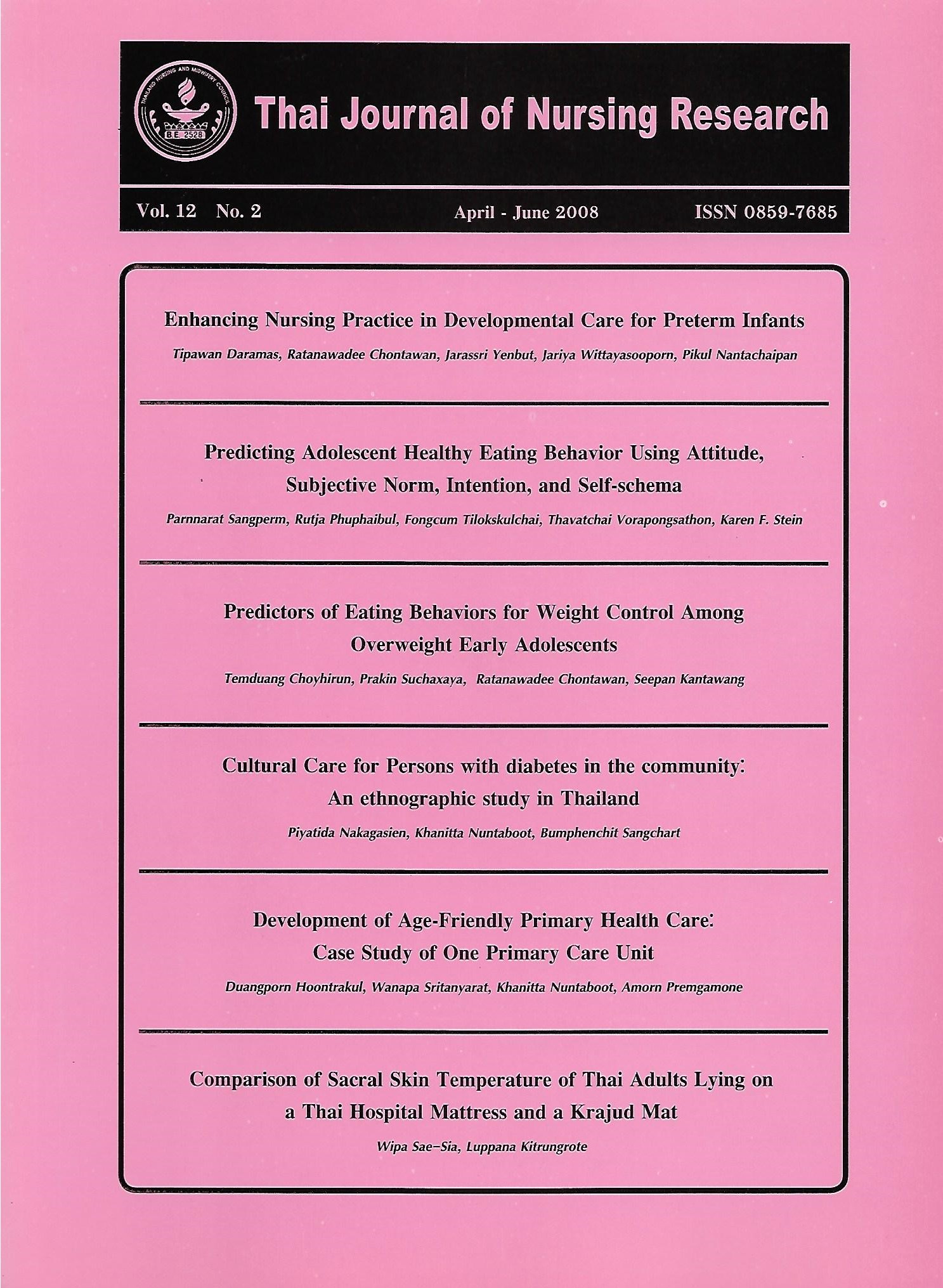Development of Age-Friendly Primary Health Care: Case Study of One Primary Care Unit
Keywords:
ความเป็นมิตรกับผู้สูงอายุ, ผู้สูงอายุ, การดูแลสุขภาพระดับปฐมภูมิAbstract
บทคัดย่อ
การวิจัยเชิงปฏิบัติการในครั้งนื้มีวัตถุประสงค์เพื่อพัฒนาบริการสุขภาพระดับปฐมภูมิที่เป็นมิตร กับผู้สูงอายุในศูนย์สุขภาพชุมชนสังกัดโรงพยาบาลมหาวิทยาลัยแห่งหนึ่งในจังหวัดขอนแก่นประเทศไทยโดย มีหลักการบริการสุขภาพที่เป็นมิตรกับผู้สูงอายุขององค์การอนามัยโลกเป็นกรอบแนวคิดเชิงเนื้อหา เพื่อนำสู่กระบวนการพัฒนาตามแนวคิดเชิงกระบวนการของการวิจัยเชิงปฏิบัติการแบบความร่วมมืออย่างเต็มที่ทุกระยะของการวิจัย เก็บรวบรวมข้อมูลโดยการสังเกตแบบมีส่วนร่วมการสนทนาตามธรรมชาติ สนทนากลุ่ม สัมภาษณ์เจาะลึก ผู้ร่วมวิจัยประกอบด้วยผู้สูงอายุและครอบครัว บุคลากรของศูนย์สุขภาพชุมชน อาสาสมัคร สาธารณสุข และกรรมการชุมชน และการศึกษาเอกสาร วิเคราะห์ข้อมูลเชิงคุณภาพโดยการวิเคราะห์เนื้อหา ข้อมูลเชิงปริมาณวิเคราะห์โดยสถิติเชิงพรรณนา ได้แก่ การแจกแจงความถี่และร้อยละ
ผลการศึกษา พบว่า
1) การบริการสุขภาพผู้สูงอายุของศูนย์สุขภาพชุมชนก่อนการพัฒนายึดหลักการความเสมอภาค มีมาตรฐานเดียวกันทุกเพศและวัยเน้นการรักษาโรคยังไม่ครอบคลุมปัญหาเฉพาะของผู้สูงอายุให้บริการตามนโยบาย การบริการยังไม่สอดคล้องกับผู้สูงอายุที่ให้ความหมายเกี่ยวกับบริการสุขภาพที่เป็นมตรกับผู้สูงอายุใน 6 ประเด็นคือ การเคารพ การบริการเชิงรุก ความเสมอภาค/เท่าเทียมในกลุ่มผู้สูงอายุ การตายอย่างสงบ การดูแลทั้งครอบครัว และสิ่งแวดล้อมทางกายภาพของศูนย์สุขภาพชุมชนที่เหมาะสมกับผู้สูงอายุ
2) กระบวนการพัฒนาเพอให้เกิดบริการสุขภาพที่เป็นมิตรกบผู้สูงอายุ ประกอบด้วย 4 ระยะคือ 1) การ ตระหนักถึงแนวคิดการบริการที่เป็นมิตรกับผู้สูงอายุ 2) การปรับเปลี่ยนพฤติกรรมการบริการ และสิ่งแวดล้อม ทางกายภาพที่เป็นมิตรกับผู้สูงอายุ 3)การพัฒนากิจกรรมและบริการที่เป็นมิตรกับผู้สูงอายุ และ4) การขยาย แนวร่วมเครือข่ายการพัฒนา
3) บริการสุขภาพระดับปฐมภูมิที่เป็นมิตรกับผู้สูงอายุของศูนย์สุขภาพชุมชนภายหลังการพัฒนาประกอบด้วย 3 องค์ประกอบคือ 1) พฤติกรรมการบริการสุขภาพทสอดคล้องกับสังคมวัฒนธรรมไทย 2) การบริการสุขภาพ ที่เป็นมิตรกับผู้สูงอายุ และ 3) สิงแวดล้อมทางกายภาพที่เป็นมิตรกับผู้สูงอายุ
4) ปัจจัยเงื่อนไขสำคัญที่เอื้อต่อการพัฒนา คือ 1) ทัศนคติในเชิงบวกของทีมผู้ร่วมวิจัย 2) การบริหารจัดการที่ยึดผลประโยชน์ร่วมกัน 3) ทุนทางสังคมในพื้นที่ที่สืกษา และ 4) การมีพยาบาลเฉพาะทางผู้ปฏิบัติ การพยาบาลขั้นสูงด้านผู้สูงอายุเข้าสู่ชุมชน ปัจจัยที่เป็นอุปสรรคต่อการพัฒนาคือ การเปลี่ยนแปลงนโยบายการบริหาร ศนย์สุขภาพชุมชนของหน่วยงานต้นสังกัด และระบบการประเมินผลงานบุคลากรศูนย์สุขภาพ ชุมชนที่เนนผลงานรายบุคคลมากกว่ารายกลุ่มและรายโครงการ
คำสำคัญ : ความเป็นมิตรกับผู้สูงอายุ ผู้สูงอายุ การดูแลสุขภาพระดับปฐมภูมิ
Abstract
This mutually collaborative action research aimed to develop age-friendly primary health care (AFPHC) for older people at one primary care unit (PCU), under the supervision of the university hospital, Khon Kaen province, Thailand. The participants were older people and their family members, nurses, the staff of the primary care unit, community health volunteers (CHVs), and community leaders. Data were collected by participatory observations, natural interviews, in-depth interviews, focus group discussions, and document reviews. Qualitative data were analyzed by content analysis. Quantitative data were analyzed by using frequencies and percentages.
The findings of six concepts of AFPHC: Respect, direct services, equity in elders group, good death, family care, and age-friendly environment, led to the process of developing age-friendly primary health care for the elders in four phases. These were: 1) awareness of AFPHC concepts, 2) changes in health service behaviors and age-friendly environments,
3) developing age-friendly services and activities, and 4) building age-friendly service networks.
The results of this study suggested that age-friendly primary care comprised of three components: age-friendly behaviors, age-friendly services, and an age-friendly environment.
Factors contributing to the development of AFPHC were: 1) positive thinking of participants, 2) management for mutual benefits, 3) social capital of local stakeholders, and 4) input from gerontological advanced practice nurses in the community. Barriers to the development of AFPHC were: 5) the changed policies of the PCU administration, 6) the personnel outcome evaluation system that focused more on individual than groups or project based.
Keywords: age-friendly service, elder, primary health care
Downloads
How to Cite
Issue
Section
License
Copyright: The Pacific Rim International Journal of Nursing Research, Thailand Nursing & Midwifery Council has exclusive rights to publish, reproduce and distribute the manuscript and all contents therein.








.png)



